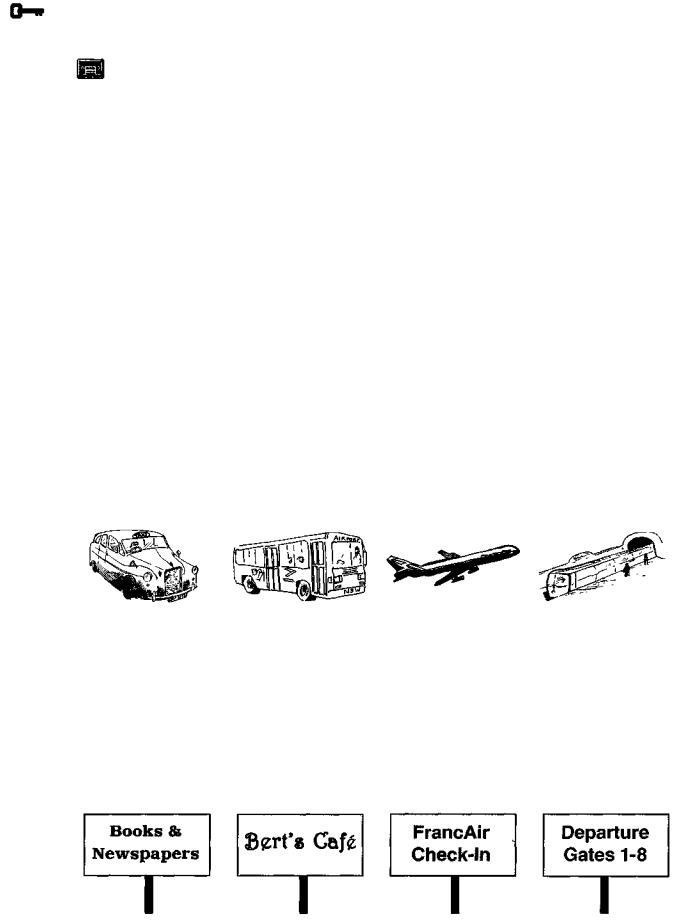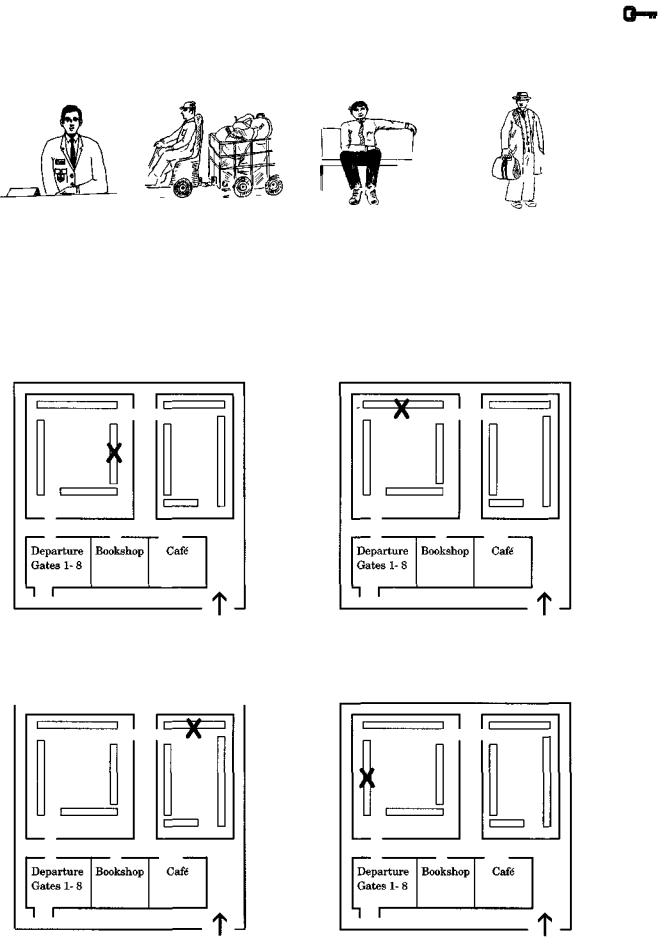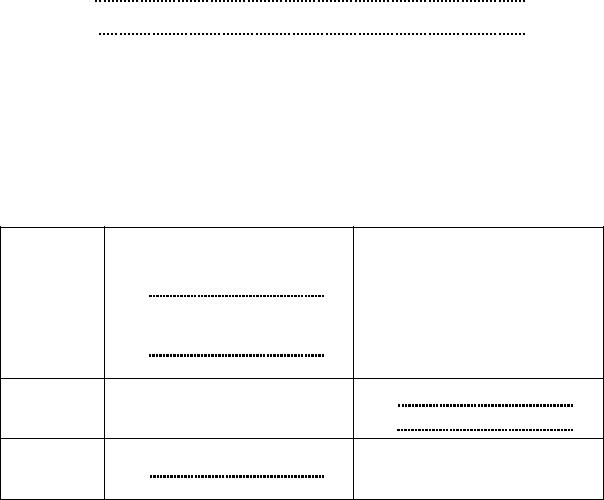
Helpful_Hints_for_IELTS
.pdfThe Practice Tests
PRACTICE TESTS
HOW TO TAKE THE PRACTICE TESTS
Before the Practice Tests
Find a quiet room with a desk, and make sure that you have enough time to complete each test and are not going to be interrupted.
You will need a pen and two photocopies of the Listening and Reading Test Answer Sheet on page 163, and a photocopy of the Writing Test Answer Sheets on pages 164 and 165. You will also need a cassette player for the Practice Listening Tests, a blank tape for the Practice Speaking Tests, and a watch or clock.
NB: The suggested times given in this book for the smaller blocks ofReading Test questions are not afeature ofthe actual IELTS Reading Test. They are given to assist with yourpractice sessions only.
During the Practice Tests
Follow each test's instructions carefully, and do not spend longer on the examination than the instructions allow. Ifyou spend longer on the Practice Tests than the instructions allow, you will not get an idea of how well you will perform in the real IELTS examination.
When you have finished the Listening Test, allow yourself 10 minutes to transfer your answers onto the Answer Sheet, give yourself a short break, and then go on to the Reading Test.
At the beginning of each part of the Reading Test there are suggestions for how long you should spend on each set of questions. Be sure to follow these suggestions carefully.
At the end of60 minutes, stop doing the Reading Test and immediately continue with the Writing Test. Then go on to the Speaking Test, and record your responses on a blank tape.
After the Practice Tests
Check your answers to the Listening and Reading Tests with the Answer Keys on pages 160 and 159. Check your answers to the Writing Tests with the Model Answers on pages 166 to 169. Ask a teacher to look at your Writing Tasks and to listen to the tape you recorded for the Speaking Test in order to estimate your scores.
Then use the Score Interpreter on page 162 to discover how well you did in each Sub-test, and how much extra English study you may need to do to improve your score. In the actual IELTS test, your Overall Band Score is the average of the 4 Sub-test Band Scores.
Once you have completed Practice Test One, and have checked with the Score Interpreter, turn to the Hints Section for help with those questions that caused you difficulty. The guide to using the 101 Helpful Hints is on page 11. Then continue the test process with Practice Tests Two, Three and Four on pages 107, 127 and 138 respectively.
85

|
101 Helpful Hints for IELTS |
Pre-Test: |
PRACTICE TEST ONE |
|
|
1-5 |
PRACTICE LISTENING TEST ONE |
DuringTest: |
|
6-10 |
|
|
This is a practice listening test that resembles the International English Language Testing System |
|
Listening Test. The test consists of four sections. Answer the questions as you listen to the |
|
recording. Note that the recording is played once only. |
8
16-17
Section 1
Questions 1-4
Decide which picture is the best match with what you hear on the tape, and circle the letter under that picture. The first one has been done for you as an example.
Example: How do George and Lisa get to the airport?
® B c
i8i9 |
Q1. What are they looking for? |
20-21 |
|
A |
B |
c |
D
D
86

Q2. Who do they ask for directions?
Practice Test One
18
1
B C D
Q3. Where is the FrancAir Check-In desk?
18
19-21-22
B
D
87

|
101 Helpful Hints for IELTS |
18 |
Q4. What does George want to buy before he catches the plane? |
A |
B |
c |
D
8
16-17
23
Questions 5-13
Fill in the information you hear on the form below in the spaces numbered 5-13. The first one has been done for you as an example.
15
20
10
14-15-19
591
14-22
591
15-19
19 -591
15-19
Check
11-15
PAID |
Excess Baggage Declaration Certificate |
(5) |
|
Given Name: (Example:) |
|
Family Name: |
(6) |
Nationality: |
(7) |
Flight Number: |
(8) |
Destination: |
(9) |
Contact Number: |
(10) |
Declaration of Contents: 11)
12)
13)
88

Practice Test One
Section 2
Questions 14 - 21
You will now hear a short news item. Fill in the gaps in the summary below with the correct word or phrase according to what you hear. The first one has been done for you as an example.
The traffic accident in ...(Example)...
has caused the death of (14) |
persons, and a |
6-10
23-25
16-17
9
15-20
further (15) |
people have been taken to St. John's |
15 |
(16) |
for treatment. The northbound |
|
and southbound lanes of Avalon Road are still closed, and
drivers are advised to avoid the area.
Police believe |
the driver of a (17) |
,... |
12-19 |
|
|
|
21 |
lost control of the vehicle before reaching the traffic |
|
||
(18) |
at the corner of Avalon Road and Batty |
1219 |
|
|
|
|
65s |
Avenue. Witnesses told reporters that they heard the lorry sound |
|
||
the (19) |
moments before it collided with traffic |
1019 |
|
turning into the (20) |
|
|
|
Anyone requiring further information should telephone the |
|
||
police hotline on (21) |
|
15-19 |
|
Check: 1 1 - 15
89

6-10
26-29
8
16-17
i4-2i
20
19
27-28
27-28
7-591
8
16-17
23-58
Check:
11-15
101 Helpful Hints for IELTS
Section 3
Questions 22 - 28
You will hear the first part ofan interview on the radio. Write a word or a short phrase to answer each of the questions below.
Q22. Which company does Julie work for?
Q23. What diploma course did Julie take at college?
Q24. What does Julie like most about her job?
Q25. What is Julie' s main responsibility when on duty?
Q26./Q27. Name two of the airline's most frequent overseas destinations:
(1)
(2)
Q28. Why does Julie regularly change the time on her watch?
Questions 29 - 33
Complete the table below with information from the next part of the radio interview. Write NO MORE THAN THREE WORDS for each answer.
|
Changes |
Benefits |
|
|
|
seats |
(29) |
to the consumer |
|
|
|
entertainment |
(30) |
to the consumer |
(31)
smoking restrictions
(32)
economy class |
(33) |
to the consumer |
|
meals |
|||
|
Table 1. Improvements to Service on British AirWorld
90

Practice Test One
Section 4
Questions 34 - 40
You will hear part of a seminar given at a Hotel Management School. Circle the letter beside the most suitable answer for each of the questions below. The first one has been done for you as an example.
Example: How many major career areas does the lecturer mention?
a) 3 |
c) |
5 |
4 |
d) |
6 |
Q34. For each professional area the lecturer discusses:
a)the professional qualifications necessary
b)the available career opportunities
c)the personal skills needed
d)all of the above
Q35. The reception desk in a hotel is described as:
a)impressive at first
b)a switchboard operating system
c)the nervous centre of the hotel
d)the first point of contact with a guest
Q36. It is essential in front desk and reception work to have:
a)a foreign language
b)a good dictionary
c)switchboard operation skills
d)none of the above
Q37. The lecturer says that a member of a drink and bar service team:
a)need not have a thorough knowledge of wine
b)must not drink on the job
c)can eventually become a wine maker
d)can eventually manage a cellar dealing only with wines
Q38. The most experienced cook is a:
a)Grade 3 chef
b)Grade 1 chef
c)Grade A chef
d)Grade 10 chef
6-10
30-33
a
16'17
9
19 • 31
20
30
31
91

101 Helpful Hints for IELTS
31Q39. Students completing the Catering Core option can start working as:
a)a Grade 2 chef
b)a Grade 1 chef
c)an Assistant chef
d)none of the above
Q40. The seminar was given:
a)by the Principal of the school
b)to introduce the school to potential students
c)to introduce students to the course options available
d)to introduce the staff to new students
OverallCheck:
Blanks: 11
Grammar 12
&65
One Answer: 13
Spelling: 14
Legibility: 15
Punctuation: 591
That is the end of Practice Listening Test One.
You now have 10 minutes to transfer your answers to the Answer Sheet. Then continue with Practice Reading Test One on page 93.
92

i |
PRACTICE READING TEST ONE |
Reading Passage 1
Questions 1-15
Practice Test One
During Test:
6-10-37
You are advised to spend about 20 minutes on Questions 1-15.
DESTINATIONS FOR INTERNATIONAL ENGLISH STUDENTS
38-44
51-57
Paragraph (i)
At any given time, more than a million international students around the world are engaged in the study of the English language in a predominantly English-speaking country. The five most popular destinations, in order of popularity, are the U. S., Britain, Australia, New Zealand, and Canada. The reasons for choosing to study English abroad differ with each individual, as do the reasons for the choice of destination.
Paragraph (ii)
Numerous studies conducted in Britain and the United States show that the country of choice depends to a large extent on economic factors. While this should not provoke much surprise, careful analysis of the data suggests that students and their parents are most influenced by the preconceptions they have of the countries considered for study abroad, which, in turn, influence the amount they or their parents are prepared to outlay for the experience. The strength of international business connections between countries also gives a good indication of where students will seek tuition. In the main, students tend to follow the traditional pattern of study for their national group.
Paragraph (iii)
The United States attracts the most diverse array of nationalities to its English language classrooms - this heterogeneity being largely due to its immense pulling power as the world's foremost economy and the resulting extensive focus on U.S. culture. Furthermore, throughout the non-European world, in Asia and North and South America especially, the course books used to teach English in most elementary and high schools introduce students to American English and the American accent from a very early age. Canada also benefits from worldwide North American exposure, but has the most homogenous group of students - most with French as their first language. Before furthering their English skills, students in Europe study frompredominantly British English material; most Europeans, naturally, opt for neighbouring Britain, but many Asian, Middle-Eastern, and African students decide upon the same route too.
Paragraph (iv)
Australia and New Zealand are often overlooked, but hundreds of thousands of international students have discovered the delights of studying in the Southern Hemisphere. The majority are Asian for reasons that are not difficult to comprehend: the proximity ofthe two countries to Asia, (Jakarta, the capital of Australia's closest Asian neighbour, Indonesia, is only 5506 kilometres from Sydney), the comparatively inexpensive cost of living and tuition, and, perhaps of most importance to many Asian students whose English study is a prelude to tertiary study, the growing awareness that courses at antipodean universities and colleges are of an exceptionally high standard. In addition, revised entry procedures for overseas students have made it possible
93

101 Helpful Hints for IELTS
for an increasing number to attend classes to improve their English for alternative reasons.
Paragraph (v)
Australia and New Zealandhave roughly the same mix ofstudents in their language classrooms, but not all students of English who choose these countries are from Asia. The emerging global consciousness of the late twentieth century has meant that students from as far as Sweden and Brazil are choosing to combine a taste for exotic travel with the study of English 'down under' and in 'the land of the long white cloud'. But even the Asian economic downturn in the 1990s has not significantly altered the demographic composition of the majority of English language classrooms within the region.
Paragraph (vi)
Nor have the economic problems in Asia caused appreciable drops in full-time college and university attendances by Asian students in these two countries. This is partly because there has always been a greater demand for enrolment at Australian and New Zealand tertiary institutions than places available to overseas students. In addition, the economic squeeze seems tohave had a compensatory effect. It has clearly caused a reduction in the number of students from affected countries who are financially able to study overseas. However, there has been a slight but noticeable shift towards Australia and New Zealand by less wealthy Asian students who might otherwise have chosen the United States for English study.
Paragraph (vii)
TheU.S. andBritain will always bethe first choice ofmost students wishingto studythe English language abroad, and it is too early to tell whether this trend will continue. However, economic considerations undoubtedly wield great influence upon Asian and non-Asian students alike. If student expectations can be met in less traditional study destinations, and as the world continues to shrink, futureinternational students ofEnglishwill be advantagedbecause the choice ofviable study destinations will be wider.
Q u e s t i o n s |
1-4 |
6
8
You are advised to spend about 5 minutes on Questions 1-4.
Complete the missing information in the table below by referring to Reading Passage 1
58"Destinations for International English Students". Write your answers in boxes 1 - 4 on your Answer Sheet. The first one has been done for you as an example.
9
Check:
11-15
|
U.S. |
Britain |
Australia |
New Zealand |
Canada |
|
|
|
|
|
|
|
|
order of popularity |
1st |
(Ex:). |
3rd |
4th |
5th |
|
type of English in course |
American |
(1) |
(2) |
not given |
not given |
|
books used in this country |
||||||
|
|
|
|
|
||
student heterogeneity |
|
2 |
|
|
|
|
1 |
(3) |
equal 3 |
5 |
|||
(1 = most heterogenous |
|
|
|
|
|
|
5 = least heterogenous) |
|
|
|
|
|
|
|
|
|
|
|
|
94
